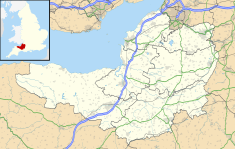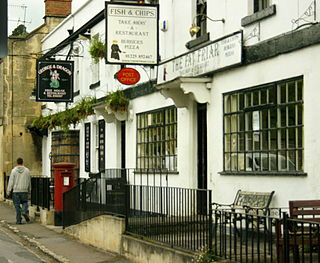
Batheaston is a village and civil parish 2 miles (3.2 km) east of the English city of Bath, on the north bank of the River Avon. The parish had a population of 2,735 in 2011. The northern area of the parish, on the road to St Catherine, is an area known as Northend.

Colerne is a village and civil parish in north Wiltshire, England. The village is about 3.5 miles (6 km) west of the town of Corsham and 7 miles (11 km) northeast of the city of Bath. It has an elevated and exposed position, 545 feet (166 m) above sea level, and overlooks the Box valley to the south.
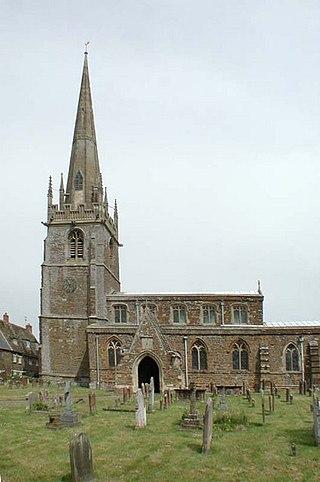
Middleton Cheney is a large village and civil parish in West Northamptonshire, England. The village is about 3 miles (5 km) east of Banbury in Oxfordshire and about 6 miles (10 km) west-northwest of Brackley. The A422 road between Banbury and Brackley used to pass through Middleton Cheney, but now bypasses it to the south.

St Nicholas Church is in the village of Burton, Ellesmere Port and Neston, Cheshire, England. It is recorded in the National Heritage List for England as a designated Grade II* listed building. It is an active Anglican parish church in the diocese of Chester, the archdeaconry of Chester and the deanery of Wirral South. Its benefice is combined with that of St Michael, Shotwick.

The Church of St Morwenna and St John the Baptist is the parish church of Morwenstow, north Cornwall, England, United Kingdom, the most northerly parish in Cornwall. The church is dedicated to Morwenna, a local saint, and to John the Baptist, and is recorded in the National Heritage List for England as a designated Grade I listed building. It is an active Anglican parish church in the diocese of Truro, the archdeaconry of Bodmin, and the deanery of Stratton. Its benefice is combined with that of St James, Kilkhampton to form the United Benefice of Kilkhampton with Morwenstow.

The parish church of St Michael the Archangel in Dundry, Somerset, England has a tower which was built in 1484, with the rest dated 1861. It has been designated as a Grade I listed building.

The Anglican Church of St Lawrence in Lydeard St Lawrence, Somerset, England dates from 1350 and has been designated as a Grade I listed building.

The Anglican Church of St Peter and St Paul in Kilmersdon, Somerset, England, dates back to the Norman period, though much of the current structure was built during the 15th and 16th centuries and restored in the Victorian era. It is a Grade I listed building.

St John the Baptist's Church is a redundant Anglican church in the village of Avon Dassett, Warwickshire, England. It is recorded in the National Heritage List for England as a designated Grade II* listed building, and is under the care of The Churches Conservation Trust.

St Peter's Church is an Anglican church in the town of Burnley, Lancashire, England. It is an active parish church in the Diocese of Blackburn and the archdeaconry of Blackburn. The oldest part of the church, the lower tower, dates from the 15th century, and there are several later additions and restorations. St Peter's is recorded in the National Heritage List for England as a designated Grade II* listed building. From 1901 to 1977, its rectors simultaneously occupied the suffragan bishopric of Burnley.

All Saints' Church is in Queens Road, Hertford, Hertfordshire, England. It is an active Anglican parish church in the deanery of Hertford and Ware, the archdeaconry of Hertford, and the diocese of St Albans. It is the civic church of the town and of the county. The church is recorded in the National Heritage List for England as a designated Grade II* listed building. It is the largest church in Hertfordshire, other than St Albans Cathedral, and can seat up to 1,000 people.

Bath and North East Somerset is a unitary authority created on 1 April 1996, following the abolition of the County of Avon, which had existed since 1974. Part of the ceremonial county of Somerset, Bath and North East Somerset occupies an area of 220 square miles (570 km2), two-thirds of which is green belt. It stretches from the outskirts of Bristol, south into the Mendip Hills and east to the southern Cotswold Hills and Wiltshire border. The city of Bath is the principal settlement in the district, but BANES also covers Keynsham, Midsomer Norton, Radstock and the Chew Valley. The area has a population of 170,000, about half of whom live in Bath, making it 12 times more densely populated than the rest of the area.

The Church of St Catherine is an Anglican parish church in St Catherine, Somerset, England. It was built in the 12th century as a chapel of ease of Bath and has been designated as a Grade II* listed building.

The Church of St Nicholas is an Anglican parish church in Bathampton, Somerset, standing between the River Avon and the Kennet and Avon Canal. Built in the 13th century, with a 15th-century tower and 18th and 19th century restorations, it has been designated as a Grade II* listed building. The church is particularly noted for its Australia Chapel, which celebrates Admiral Arthur Phillip, the first Governor of New South Wales who was buried there in 1814, while the churchyard contains several other significant tombs.
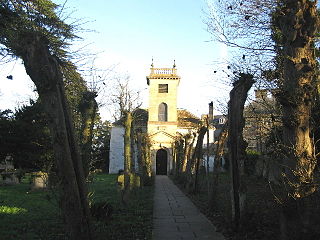
The Church of St Mary is a Church of England parish church in Berkley, Somerset. It is a Grade II* listed building built in 1751.

St Piran's Church is an active Anglican parish church in Perranarworthal, Cornwall, England. It is part of a united benefice consisting of eight churches, the Eight Saints Cluster, in the parishes of Stithians with Perran-Ar-Worthal and Gwennap. The benefice has four licensed clergy and four readers. The church, dedicated to Saint Piran, is in the Carnmarth, North deanery, the archdeaconry of Cornwall and the Diocese of Truro. The church was granted Grade II* listed status in May 1967. The churchyard contains several listed chest tombs and headstones.
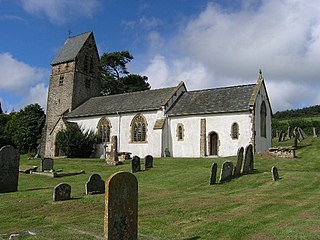
The Anglican St Mary's Church at Luxborough within the English county of Somerset dates from the 13th century. It is a Grade II listed building.

The Anglican Church of St James the Great in Fitzhead, Somerset, England was built in the 15th century. It is a Grade II* listed building.

The Anglican Church of St Andrew Compton Dundon, Somerset, England was built in the 14th century. It is a Grade II* listed building.

St Weonard's Church, St Weonard is a Grade I listed parish church in St Weonards, Herefordshire, England.

